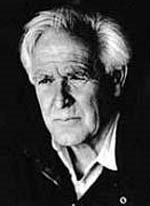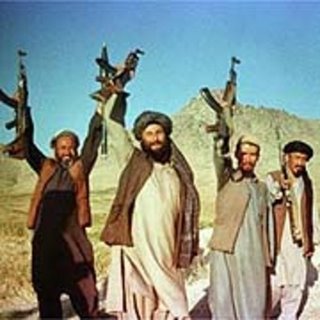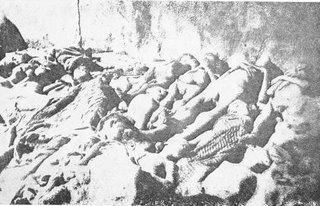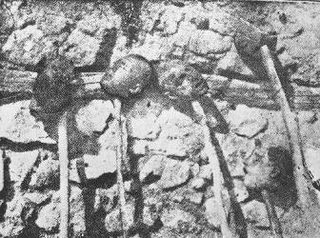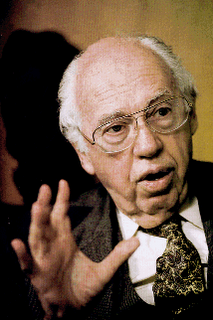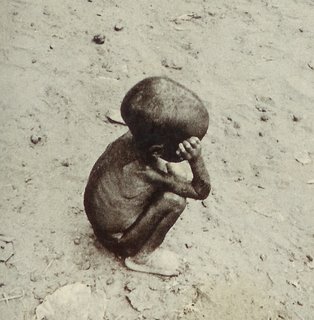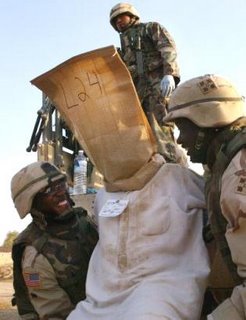
En terwijl het Nederlandse kabinet met goedkeuring van de PVDA nog meer troepen stuurt naar het Midden Oosten beseffen de Amerikaanse autoriteiten steeds meer dat hun gewelddadige politiek niet het gewenste resultaat oplevert.
'General Concedes Failure in Baghdad.
The San Francisco Chronicle
Friday 20 October 2006
Bush acknowledges comparison to '68 Tet offensive in Vietnam.
In a confluence of grim official assessments of the war in Iraq, President Bush acknowledged that sectarian bloodletting in Baghdad could be compared to the Viet Cong's 1968 Tet offensive in Vietnam, and one of the top U.S. generals said the American military's two-month drive to crush the spiraling violence in the Iraqi capital had failed.
Such downbeat opinions, accompanied by reports of alarmingly high American casualties and unabated violence in Iraq, indicate that U.S. officials at the highest levels are rethinking the progress the United States is making in Iraq, experts said.
"What this suggests to me is that people in fairly senior levels are getting increasingly worried about what's going on," said Jeffrey White, an expert on military and security affairs at the Washington Institute for Near East Policy.
"The increasing pessimism among serious analysts of the conflict is beginning to have an effect," said White, a former government intelligence analyst. "Policy makers are beginning to, if not accept the ultimate conclusions, then at least the main thrust of it: that we're not getting better, that the Iraqi government isn't working, that the Iraqi security forces are not standing up the way we would like them to."
Bush, who had rejected parallels between the fighting in Iraq and the Vietnam War, reconsidered his stance in an interview with ABC News on Wednesday, saying that New York Times columnist Thomas Friedman "could be right" in comparing the violence in Baghdad to the Tet offensive. "There's certainly a stepped-up level of violence, and we're heading into an election," Bush said.
On Jan. 30, 1968, communist North Vietnamese troops chose Tet, the Vietnamese lunar New Year holiday, to launch coordinated ground attacks against American bases and cities across South Vietnam. Many Vietnam historians call the offensive a turning point for the war in Vietnam as well as a prime reason why President Lyndon Johnson withdrew from his re-election campaign.
Bush's spokesman, Tony Snow, said Thursday that "we do not think there has been a flip-over point" in Iraq. "We are going to continue pursuing victory aggressively," he said.
But on Thursday, Maj. Gen. William Caldwell, the top U.S. military spokesman in Iraq, announced that the American-led crackdown on violence in Baghdad had failed and said U.S. commanders were consulting with the Iraqi government on a new approach.
"It's clear that the conditions under which we started are probably not the same today, and so it does require some modifications of the plan," Caldwell said.
"The violence is indeed disheartening," he noted.
"Gen. Caldwell's admission is yet another indication that the enemy is winning," said Loren Thompson, a defense analyst at the Lexington Institute, a centrist think tank in Arlington, Va. "Commanders in the field are beginning to suggest a lack of success."
Caldwell's assessment came as the military announced the deaths of three U.S. troops in Iraq, raising the number of American military deaths in October to 74. Car bombs, mortar fire and small-arms fire across Iraq killed at least 66 people -- including the police commander of the volatile Sunni Anbar province, who was shot to death in his own house -- and wounded 175.
Growing frustration with the continuing drumbeat of bad news from Iraq has driven political debate in the final weeks of the congressional election campaign. As Americans have become increasingly opposed to the war, some of the staunchest Republican supporters of Bush's foreign policy, such as the influential Virginia Sen. John Warner, the chairman of the Senate Armed Services Committee, and Sen. Chuck Hagel of Nebraska have joined the Democrats in calling for a new Iraq strategy.
"This is not about Democrat versus Republican anymore," said Joseph Cirincione, an expert on Iraq and the senior vice president for national security at the Center for American Progress, a liberal policy think tank. "It's serious, senior people across the political spectrum saying this strategy has failed."
Richard Haass, a former Bush administration foreign policy official, said Thursday that the situation is reaching a "tipping point" both in Iraq and in U.S. politics. "More of essentially the same is going to be a policy that very few people are going to be able to support," said Haass, now president of the Council on Foreign Relations. He added that the administration's current Iraq strategy "has virtually no chance of succeeding."'
Lees verder: http://www.sfgate.com/cgi-bin/article.cgi? file=/c/a/2006/10/20/MNGJ9LT21H1.DTL Of:
http://www.truthout.org/docs_2006/102006E.shtml
